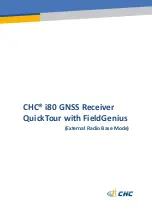4
The unit should now begin to send in updated location information at ~5 minute intervals any time that the
vehicle is in motion, and one hour intervals when the vehicle is stationary. After verifying that SageTracker
is working satisfactorily, mount the unit in its final installation location to verify that you are still receiving
Address Information with each incoming message. If not, you may not have sufficient GPS signal and will
need to find an alternate location for your antenna.
View your Reports Online
: On any internet connection, log on to www.sagetracker.com and click on My
Site. Using the username and password included with your unit, sign on to your account. To see your first
tracks, select the Vehicles & Locations tab. Click on Today’s Track, then click on the Show Me button to bring
up the map and report. Make sure your pop up blocker allows pop ups from the tracking site.
Here a few tips to help you get the most out of your unit:
SageTracker will attempt to generate a new location report anytime motion is detected. If the GPS satellite
signal is too weak for the device to generate an updated location, it will still generate a status report for that
time period which will not contain an updated location. SageTracker will be unable to generate a GPS
geographic location fix when it is located inside enclosed structures, such as a garage or storage unit. It will,
however, continue to monitor for motion when inside a garage and will attempt to fix its location as soon as
motion is detected. SageTracker will spend up to five minutes generating a GPS fix, so if the device is
leaving a garage when motion begins; it will spend a good portion of its search time outside the garage. If
after 10 minutes SageTracker is unable to fix its location, it will send a report to the web without an updated
address.
If you install the unit next to other transmitting devices, such as satellite radios, VHF, radar, or other
SageTrackers, they may interfere with each other.
SageTracker uses the GSM cell phone network in the United States to send its reports to the tracking
program, so its ability to connect to the internet is limited by the coverage of this network. Coverage in
populated areas is generally very good, but can be limited in remote regions.
Troubleshooting
1.
The device is reporting, but there is no address in the Address Column:
If the unit is sending in reports to the website at the proper interval when the vehicle is in motion, but the
address information is missing from the Address column, then the most likely cause is a weak GPS satellite
signal at the antenna’s location. This problem can most often be remedied by moving the antenna from its
current location to an alternate location. As a quick check to make sure that the device is functioning
properly, place antenna in a location with excellent visibility to the open sky to verify that it does report
addresses under these conditions.
2.
The reported address is not correct:
There are two possible causes for the unit appearing to report an incorrect address.
No GPS Location
reported during last GPS fix cycle: If the vehicle has moved from its previous location, but
the SageTracker device was not able to generate a new location report due to a weak or non-existent GPS
signal, then the tracking software will place the vehicle at the last known location on the map.
Map Inaccuracies
: SageTracker uses a set of public domain maps in order to keep the overall device costs
as low as possible. While these maps are generally very accurate, they may not be completely updated in
areas of rapid urban growth. We have also had occasional reports of the street address not being accurate,
although in this case the physical location on the map generally agrees with the physical location of the unit.


















